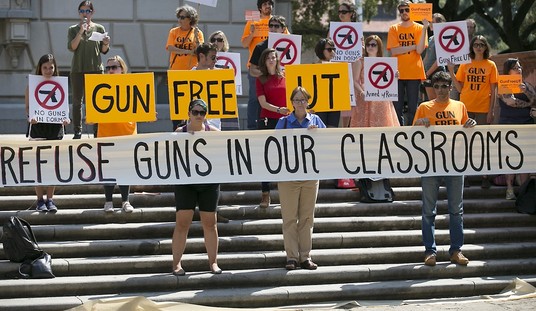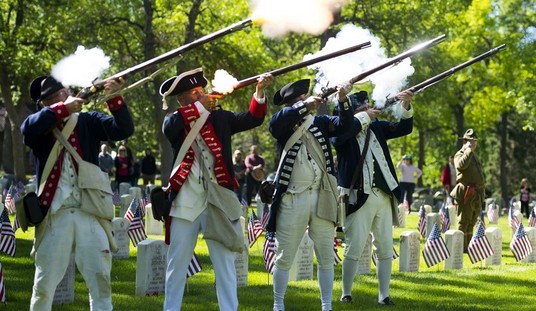Virginia Democrats are doing their best to try to portray the Second Amendment Sanctuary movement as some sort of lawless call for anarchy, but they keep running up against the simple fact that lawmakers make laws, they don’t enforce them.
The latest to take a stab at the Second Amendment Sanctuary movement is Delegate David Toscano, a Democrat from the Charlottesville area first elected to the House of Delegates back in 2005. Before that he served as mayor of the ultra-liberal college town of Charlottesville, and he’s been a reliable vote for every failed attempt at gun control since he’s been in office. Now he has his chance to inflict some real damage to the right to keep and bear arms in Virginia (or as he’d put it, put common sense gun safety regulations on the books that will save lives without infringing on the rights of gun owners) as part of the first term of the Democrat-controlled state government in 26 years. He can’t stand the Second Amendment Sanctuary movement, but his argument against the movement is actually an attack on a strawman, not the real movement that’s sweeping the state.
Conservatives have railed for years against so-called “sanctuary jurisdictions,” criticizing localities that refuse to cooperate with federal immigration policies they deem heartless and ineffective. In the past year, however, some conservative lawmakers have taken a page from the progressive playbook, employing sanctuary imagery in opposition to gun safety legislation they deem to be an unconstitutional restriction of their rights under the Second Amendment.
The two approaches are classic cases of false equivalency. Jurisdictions that proclaim themselves sanctuaries for immigrants do not seek to violate the law; they simply refuse to engage local law enforcement in supporting actions that are federal responsibilities. They do not block the law, but simply insist that it should be enforced by those who have the responsibility to do so. For some proponents of so-called gun sanctuaries, however, the goal is to prevent enforcement of state law that the jurisdiction (not a court) deems unconstitutional.
I think folks are getting too hung up on the “Sanctuary” part of the Second Amendment Sanctuary movement. Call it what you like, but the real comparison is not to sanctuary cities for illegal aliens, but the number of law enforcement officials around the country, including Virginia, who have said they won’t be arresting or prosecuting individuals for low-level drug offenses. WAVY-TV reported on one commonwealth’s attorney in the state who announced she wasn’t going to enforce a portion of state law back in the spring, without any protest by Governor Northam or Del. Toscano.
Portsmouth Commonwealth’s Attorney Stephanie Morales says her office will no longer prosecute possession of marijuana cases in the Portsmouth General District Court.
In a letter Morales sent to the judges earlier this week, she says the policy change is effective immediately and that all cases would be dismissed with the payment of court costs.
Morales tells 10 On Your Side she started having conversations with judges in March, and they are on board with dismissing the charges.
“It’s really important for us to think as a criminal justice system about why we are doing the things we are and the way were are doing them,” Morales told 10 On Your Side’s Jason Marks. “It is really time we think about how we start to decarcerate as opposed to incarcerating for every type of crime. This is one those cases we really don’t have dangerous violent occurrences resulting from possession of marijuana.”
No, but you may have individuals driving while under the influence. Still, the vast majority of individuals who have small amounts of cannabis on them aren’t going to do anything other than smoke it. And the vast majority of individuals who possess 20 round magazines or AR-15’s aren’t going to do anything other than use them for target shooting, competition, self-defense, hunting, and the lawful purpose of possessing arms to ensure the security of a free State, if need be.
If Stephanie Morales has the discretion not to prosecute misdemeanor drug offenses, then other commonwealth’s attorneys in Second Amendment Sanctuaries must possess the same discretion not to prosecute misdemeanor gun offenses, or even non-violent possessory firearm offenses more generally.
Democrats have led the way in helping Republicans understand the power of discretionary enforcement of the law, regardless of any formal declaration of a sanctuary status. Delegate Toscano tries to make the argument that Virginia’s status as a Dillon Rule state precludes law enforcement from not enforcing unconstitutional gun laws, but again, he’s arguing against a strawman of his own creation.
Proponents of Second Amendment sanctuaries have another problem in Virginia; the Commonwealth is what we call a “Dillon Rule” state. This means that if a power is not specifically permitted to a locality, state law rules. Progressives have been especially critical of Dillon Rule arguments in years past, believing that they have prevented localities from enacting policies—from local minimum wage ordinances to gun prohibitions—that seek to go further from state law. They have rarely been concerned that more conservative localities, if granted greater “home rule,” might enact policies, such as environmental regulations or building codes, that are more lax than state law. The Second Amendment sanctuary rebellion may prompt some to reexamine their views about how much additional power should be granted to localities.
Elsewhere in his piece, Toscano tried to compare the Second Amendment Sanctuary movement to Massive Resistance, a movement in Virginia that tried to keep school segregated in the wake of the Brown v Board of Education decision. It’s an odious comparison, and Toscano’s off-base in making it. While there may be massive amounts of resistance to these impending gun control laws, the movement is actually one of Passive Resistance. You want your laws enforced? Then go try and enforce them. But even under the Dillon Rule we know that commonwealth’s attorneys have the discretion to choose to ignore entire laws in the state statute without a word of criticism by the governor or the state’s attorney general. If the commonwealth’s attorney has that discretion, why wouldn’t a county sheriff?
The only proposed gun-control law regarding the possession of firearms (as opposed to the commercial sale of guns) where passive resistance really won’t work is when it comes to enforcing “red flag” laws. We haven’t seen specific language introduced for the legislative session beginning in January yet, but it would be possible for Democrats to craft a bill that, if they wanted to, avoided a conflict with county sheriffs and commonwealth’s attorneys entirely by using the state office of the Attorney General and the Virginia State Police. That wouldn’t avoid a conflict completely, but it would negate the Second Amendment Sanctuary issue.
If, on the other hand, Governor Northam and anti-gun lawmakers want to pick a fight with Second Amendment Sanctuary communities, then they’ll leave it in the hands of the commonwealth’s attorneys to argue for any Extreme Risk Protection order that’s filed, and the county sheriffs to go and confiscate the firearms of those disarmed without their day in court.
There’s no great solution, because it’s a bad idea to begin with. Instead of pushing a red flag law, which only disarms someone that a judge has determined may be a threat to themselves or others instead of treating them, the state needs to invest real resources into expanding mental health resources. Virginia already has a civil commitment law that allows for a 72-hour hold on individuals while doctors determine if they’re a danger to themselves or others. That’s a much better system than a judge hearing one side of the story and then using a low burden of proof to strip someone of their legally owned firearms. From both a Constitutional and a practical perspective, the red flag law is a bad idea.
I think it’s going to go from being a bad idea to a bad law, however, and that means that Governor Northam and Democrats are going to have to decide between two bad choices. If I had to guess, I’d say he leaves it with the counties to enforce the law, even if that means that in practice many commonwealth’s attorneys and county sheriffs use the existing civil commitment laws instead of “red flag” orders. Whether or not that results in the governor trying to impose “consequences” on the recalcitrant counties remains to be seen. Buckle up. It’s going to be a crazy few months here in Virginia.









Join the conversation as a VIP Member